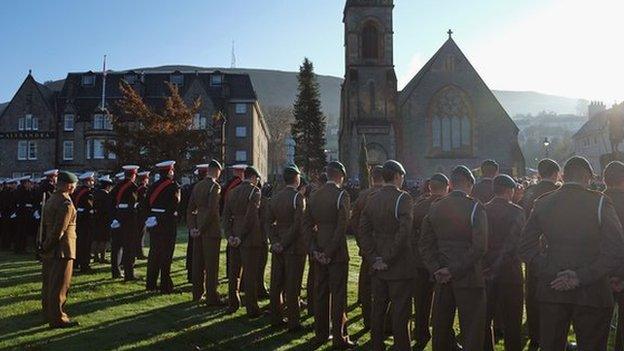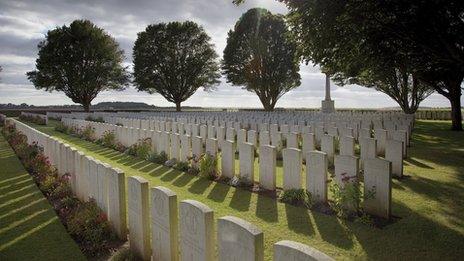Remembrance Sunday: Nation falls silent as Queen leads commemorations
- Published
Highlights from the wreath laying ceremony at The Cenotaph
The Queen has led the nation in remembering service personnel killed during conflicts, as Remembrance Sunday services were held around the UK.
A two-minute silence was observed before the monarch laid a wreath at the Cenotaph in central London.
Events have been held across the UK and abroad, including in Afghanistan where Prince Harry joined troops in Kandahar and laid a wreath with them.
This year marks the 100th anniversary of the start of World War One.
It is also 70 years since the D-Day landings, and the year Britain ended its combat role in Afghanistan after 13 years of fighting.
Prime Minister David Cameron said the anniversaries made the commemorations "particularly poignant".
Other ceremonies included:
In Staffordshire, where 2,000 gathered at the National Memorial Arboretum for an outdoor service.
In Scotland, where First Minister Alex Salmond and Scottish Secretary Alistair Carmichael laid wreaths at St Giles Cathedral in Edinburgh.
In Northern Ireland, where Northern Ireland Secretary of State Theresa Villiers laid a wreath at the Cenotaph at Belfast City Hall.
In Wales, where the national service took place at the Welsh National War Memorial in Cardiff.
Services were held in cities including London, Edinburgh, Cardiff and Belfast
Security was visibly tighter in central London this year.
Other members of the Royal Family, including the Duke of Edinburgh, Prince Charles and Prince William, joined the Queen in laying wreaths. Mr Cameron, Deputy Prime Minister Nick Clegg and Labour leader Ed Miliband also paid their respects.
Forty-six high commissioners from Commonwealth countries each then laid a wreath before the Irish ambassador to the UK, Dan Mulhall, left a floral tribute.
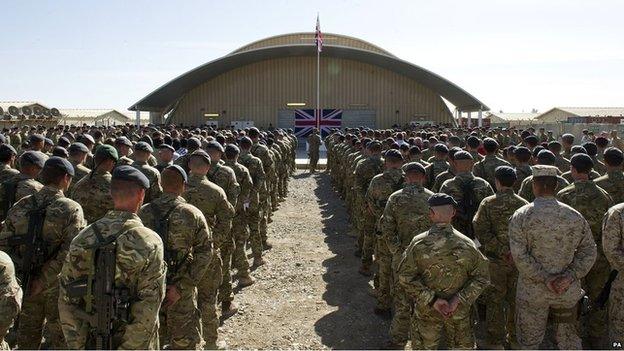
A remembrance service took place at Kandahar Air Base in Afghanistan
It is the first time since 1946 that a representative from Ireland has participated in a wreath-laying ceremony in London. Fifty-thousand Irish men died in World War One.
The chiefs of the armed forces, representatives of the UK's different faiths and members of the civilian services also laid wreaths.
As the Queen left the Cenotaph, spontaneous applause spread through the crowds.

At the scene
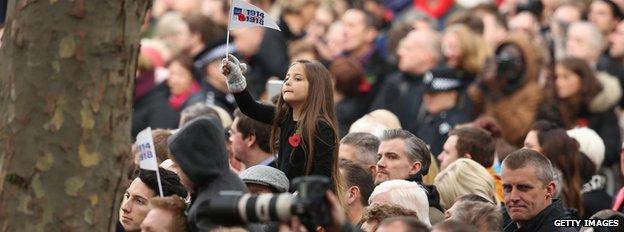
By Lauren Turner, BBC News
As one, the thousands of people lining Whitehall bowed their heads the moment Big Ben struck.
All that could be heard at 1100 GMT was the fluttering of leaves on what was a crisp autumn day, and the distant sound of birdsong.
There were veterans wearing medals alongside families in jeans and trainers.
What united them was not just the red poppy pinned on almost every chest, but their reason for being there - to stand together in memory of the nation's war dead.

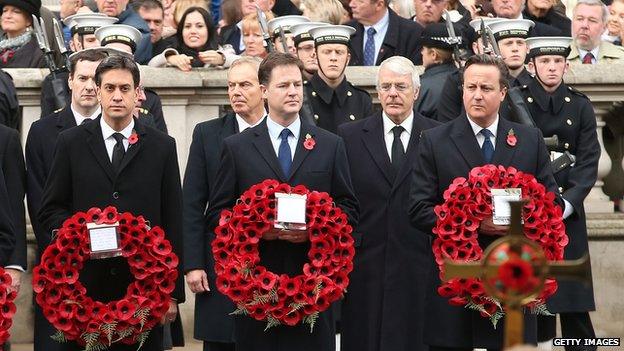
Leaders of Labour and the Lib Dems and former prime ministers joined the Prime Minister
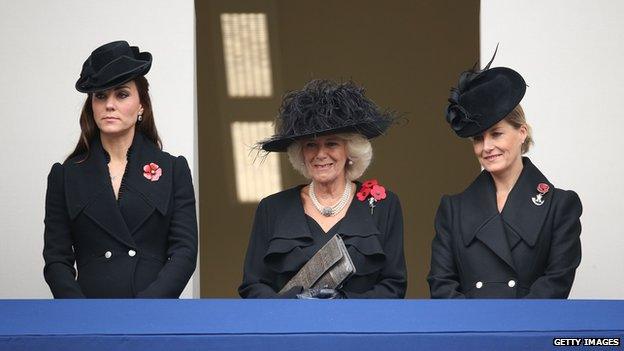
The Duchess of Cambridge, Duchess of Cornwall and Countess of Wessex watched proceedings
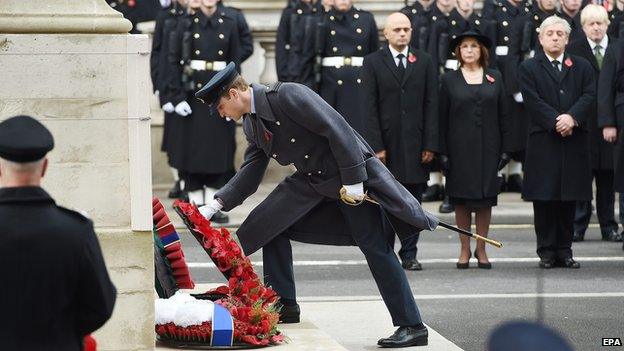
Other members of the Royal Family lay wreaths after the Queen
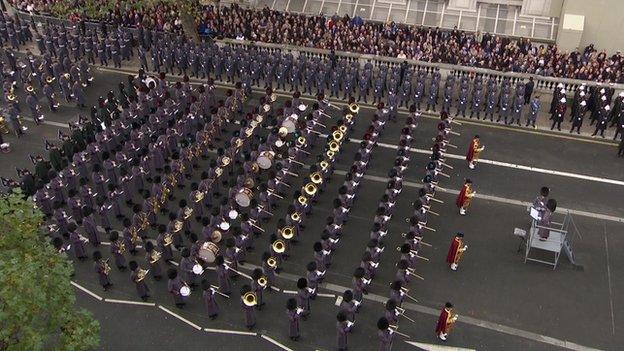
Bands played at the service in central London
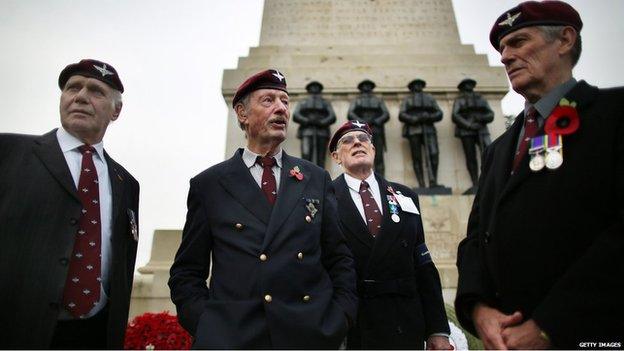
Veteran members of the Guards Parachute Company Pathfinders were among others gathering in central London
'Intensity and poignancy'
Before the ceremony at the Cenotaph, Scotland Yard said there would be "appropriate and proportionate" policing after four men were arrested on Thursday in west London and High Wycombe over an alleged Islamist terrorism plot on British soil.
Gen Sir Nicholas Houghton, Chief of the Defence Staff, said "the proximity of the sense of threat for this weekend" had "intensified" security levels.
But "we've just got to keep continuing our normal life," he said.
"The last thing that we at all would want to do is succumb to any sense that there is a terrorist threat there that is at all going to stop the British way of life."

At The Cenotaph
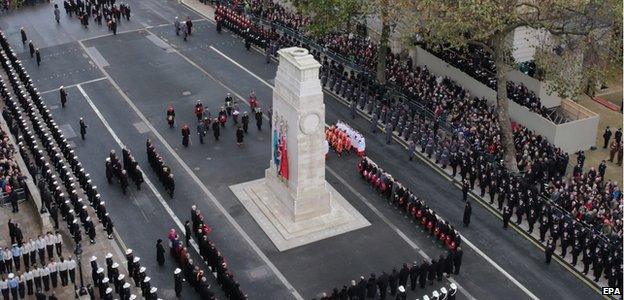
By Sarah Campbell, BBC News
From early morning, the public started taking their places along Whitehall, and by the time of the two-minute silence at 11 o'clock the pavements were completely full.
As always, Her Majesty the Queen laid the first wreath on the steps of the Cenotaph. She was followed by the Duke of Edinburgh, himself a veteran of the Second World War.
As the sun shone through the clouds, 10,000 veterans marched past the Cenotaph accompanied by a rousing soundtrack from the Massed Bands.
This year has had an extra poignancy with the centenary of the outbreak of World War One. But the varying ages of the men and women taking part in this service, as well in the crowds looking on, reflects the fact that those who've been killed or injured in much more recent conflicts are equally in people's thoughts.

'Terrible sacrifice'
Mr Cameron said: "Today we stand united to remember the courageous men and women who have served our country, defended our freedoms and kept us safe."
In Kandahar and the Afghan capital, Kabul, members of the British armed forces stopped operations to commemorate the dead across the generations.
Brigadier James Stopford said: "For those of us serving here in Afghanistan on operations, we remember with enormous pride the terrible sacrifice by our UK armed forces colleagues and those of our coalition partners, and in particular the very brave members of the Afghan security forces.
"Our shared sacrifice has made a significant difference to this country and ours and continues to do so - we will remember them."
Britain ended combat operations in Afghanistan last month after a 13-year-long war in which 453 UK service personnel died. Most troops have now been withdrawn but 500 will stay on as mentors and trainers after 2014.
Gen Sir Nicholas Houghton said there had been "intensified" security
Ceremonies of remembrance on Sunday were also held in Commonwealth countries including India, Sri Lanka and Malta, as well as in Israel.
In London, thousands of people chose to pay their respects at the Tower of London, where almost 900,000 ceramic poppies have been planted as a temporary memorial.
The crowd included British veterans of the conflicts in Iraq and Afghanistan.
Bradley White, 28, from Essex, who served in both countries, said: "It is the first time I have come to London for Remembrance Day, so it is poignant to remember all those who died serving their country.
"It is quite emotional when you look at the sheer scale of it. When we were out in Afghanistan we lost nine soldiers [from the 1st Battalion, Royal Anglian regiment], and numerous more since. So, it does bring back poignant memories from when we were out there."
After dusk falls in London, images of falling poppies are to be projected on to Big Ben, officially known as Parliament's Elizabeth Tower.
On Saturday, the Queen and other members of the Royal Family joined veterans and the public at the Royal British Legion's annual Festival of Remembrance at the Royal Albert Hall in London.

World War One Centenary
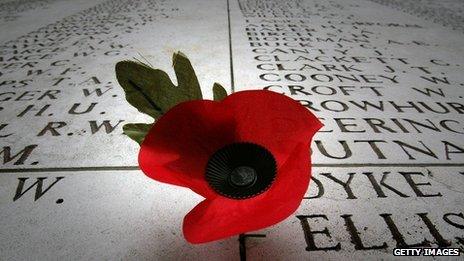

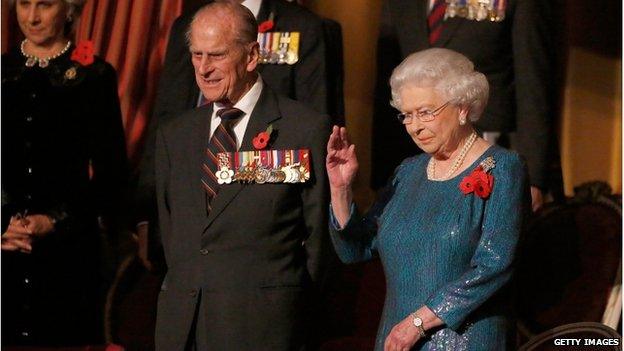
The Queen and Prince Philip attended a remembrance event at the Royal Albert Hall on Saturday
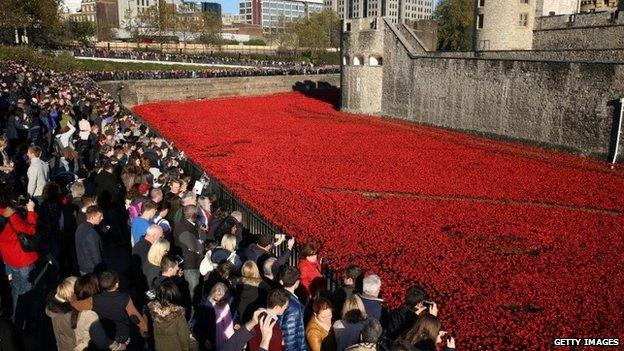
There were more visitors on Sunday to the ceramic poppies installation at the Tower of London

World War One Centenary
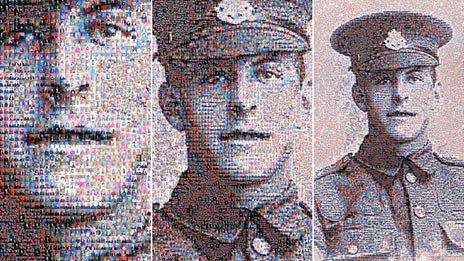

Meanwhile, the National Secular Society has written to the government asking it to review the role of the Church of England at the national ceremony of remembrance, which it argues should be equally inclusive of all citizens, regardless of religion and belief.
The society believes the commemoration should be redesigned to make it an inclusive national event, not led by a single Christian denomination.
- Published9 November 2014
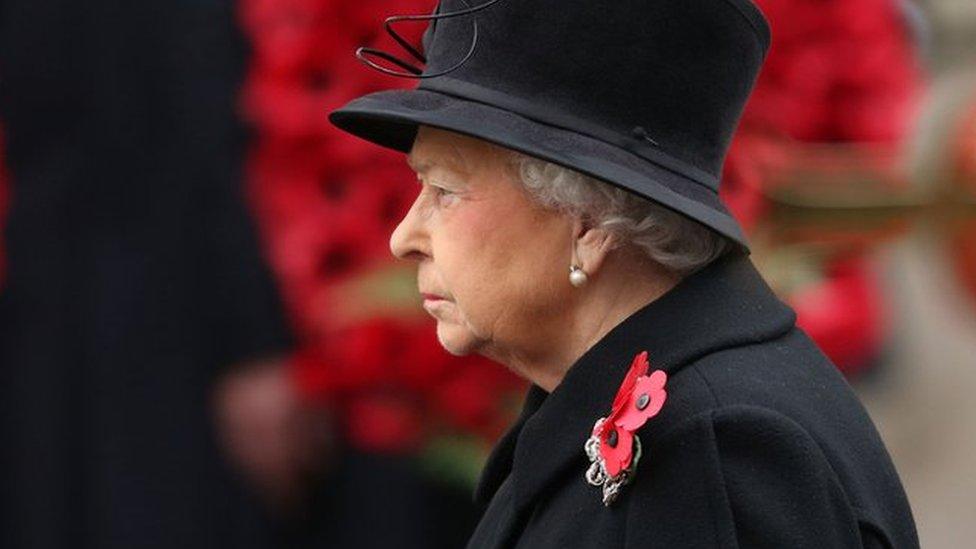
- Published9 November 2014
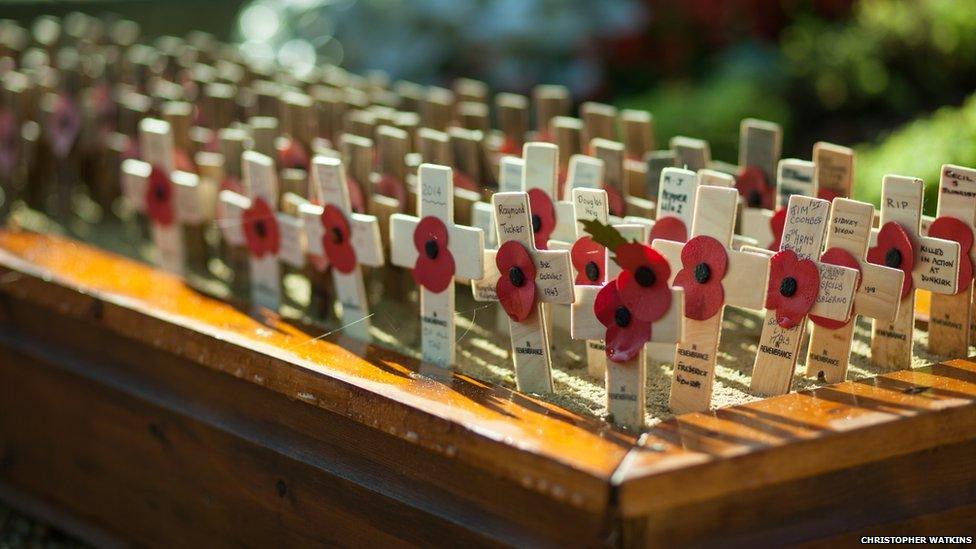
- Published9 November 2014
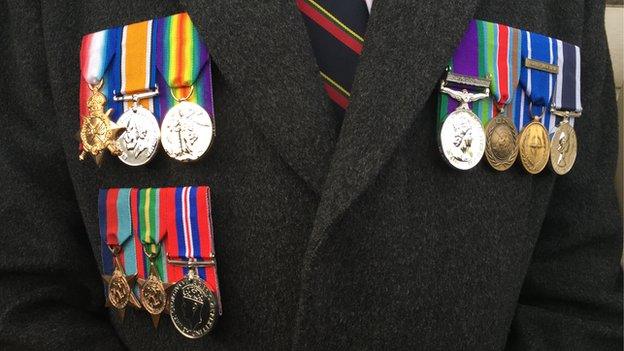
- Published9 November 2014
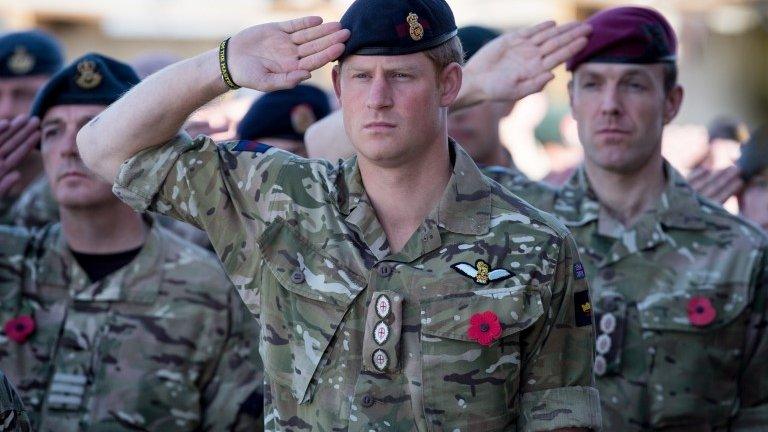
- Published8 November 2014
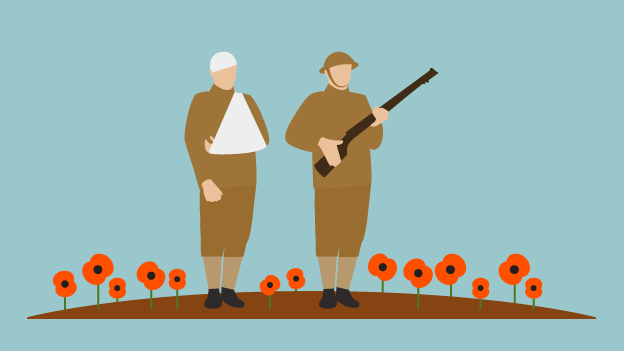
- Published9 November 2014
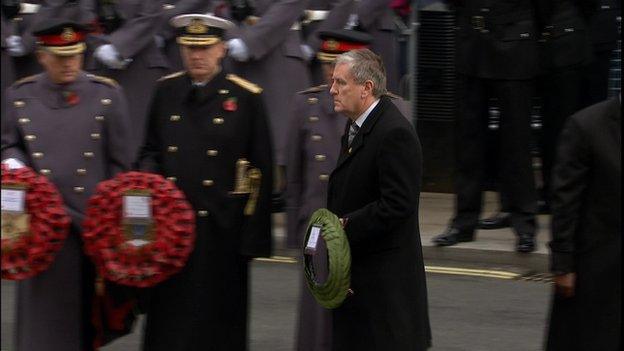
- Published9 November 2014
